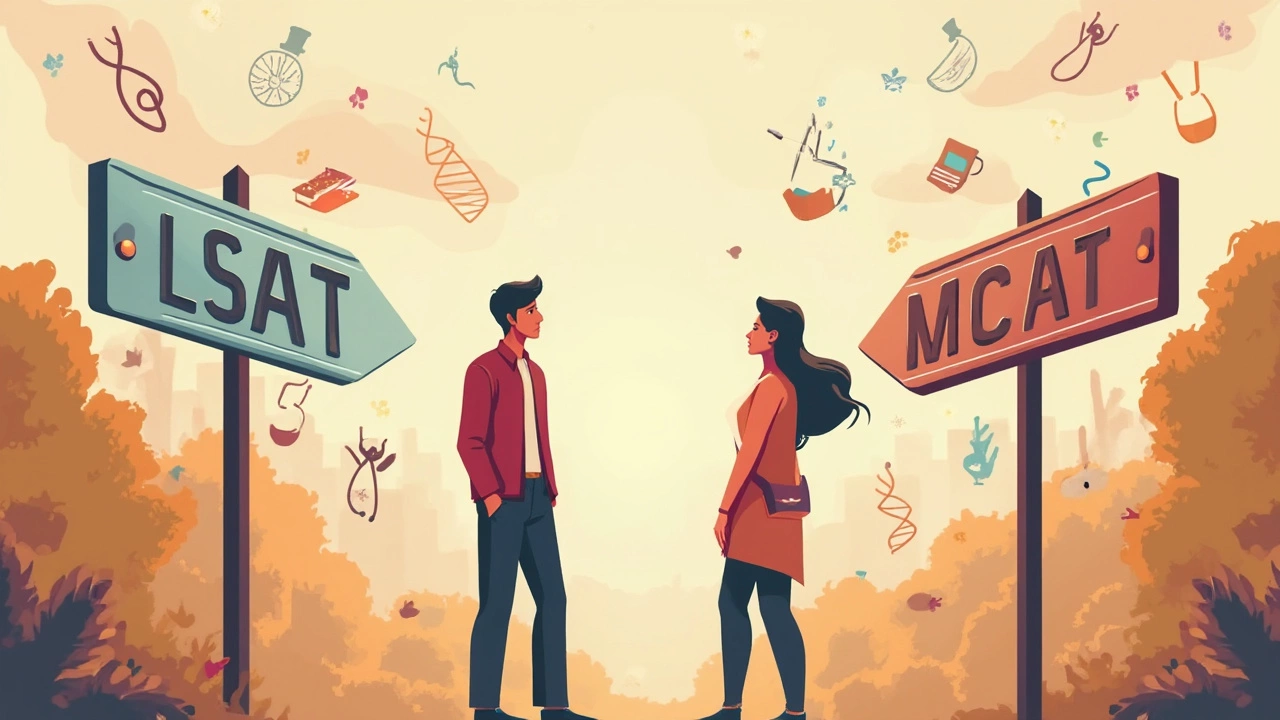You hear people talking about the LSAT and the MCAT like they’re mythic beasts—conquering either one wins you bragging rights for life. But if you ask anyone who’s faced both, a clear winner for "hardest test" isn’t so obvious. The LSAT is the gatekeeper for law schools, and the MCAT is what every would-be doc needs to face. Both have their own flavor of pain. So, which one demands more from your brain—and which one is a bigger hurdle for your dreams? Time to look beyond the coffee shop debates and find out.
The Nitty-Gritty: What Each Test Really Demands
Ready for the basics? First up, the LSAT. This test shows up five times a year, made up of multiple-choice sections that measure your reading comprehension, analytical reasoning (famously called logic games), and logical reasoning. You’ll need laser-sharp logic and a knack for solving puzzles under time pressure. Not an ounce of actual legal knowledge shows up—think of it as the Olympics for arguing and critical thinking.
The MCAT is a different beast. It runs over seven hours—yes, seriously, seven—with a heavy dose of biology, chemistry (both general and organic), physics, psychology, and sociology. There’s even a big section on critical analysis and reasoning (the CARS section), but this isn’t close to the logic games in the LSAT. Instead, you’re swimming through dense science texts, charts, and scenarios, all while your energy drains hour by hour.
If you try to prepare for either one with the wrong playbook, you’re toast. For the LSAT, that means doing every official prep test you can find, breaking down each logic game until you could teach them with your eyes closed. For the MCAT, you need a marathoner’s mindset—hundreds of flashcards, review books, and full-length practice tests. Cramming doesn’t cut it. Give yourself at least three months for LSAT prep; for the MCAT, most people need at least four to five months, if not more.
But maybe the most shocking difference? The LSAT is paper or digital, lasting just under three hours. The MCAT is entirely computerized and famously exhausting. On average, the MCAT attracts more repeat test-takers too: stats from the AAMC show about one in three test-takers sits for it more than once.
Different Skills, Different Headaches
You don’t just study for these two the same way. The LSAT rewards pattern recognition, fast logic, and flawless attention to detail. If you zone out for just a split second in a logic game, that’s two questions—and maybe your future—gone. Rapid-fire thinking is key. The best LSAT scorers are obsessed with breaking down each wrong answer to see exactly what the test makers are up to.
The MCAT tests your raw knowledge and the ability to apply it. Memorizing countless facts is part of the grind, especially in those massive biology and organic chemistry sections, but the trick is being able to use that knowledge in unfamiliar ways. One minute you’ll answer a basic question about DNA, and the next you’re reading a three-page scientific experiment, hunting for the method in the madness. Those who crush the MCAT usually started prepping while still taking science courses in university, using textbooks as much as dedicated MCAT prep material.
The stress? Different flavors. The LSAT can mess with your nerves—not only do you need to stay calm, but you also need to recover mentally after each section. For the MCAT, it’s physical as much as mental. Coffee helps for the first hour; eventually, your willpower is the only thing left.
Don’t forget the writing sections. The LSAT now has an unscored writing sample—law schools glance at it just to verify you know how to write in English. The MCAT’s old writing section is gone, but its CARS section feels like a literary torture device. According to one third-year UBC med student, “I thought the science would be harder, but CARS is probably what did the most damage.”

Statistics and Scores: How Do People Really Perform?
Numbers don’t lie. Median LSAT score is about 152 out of 180, but the real bloodbath happens at the high end—breaking 170 puts you in the top 2%. For the MCAT, out of 528 possible points, the current average score is 500, but top med schools want scores above 515 (that’s the 92nd percentile, give or take).
Let’s break it down:
| Test | Average Score | Top Score | Recommended Prep Time |
|---|---|---|---|
| LSAT | 152 / 180 | 180 | 3-6 months |
| MCAT | 500 / 528 | 528 | 4-8 months |
The stakes for retaking? Both tests let you try again, but law schools and med schools do notice. Some law schools average your LSAT scores; others take the highest. For the MCAT, almost every school sees all your scores—most focus on your best, but some will see all your attempts. There’s one big mental game here: nobody wants an application with a dozen retakes.
According to the Law School Admission Council, about 35% of LSAT takers retake the exam at least once. For the MCAT, AAMC studies show that roughly 28% are repeaters. Either way, it’s a long haul to hit those top percentages.
“Acing the LSAT is like untangling a mess of logic knots under a ticking clock. The MCAT is running a knowledge marathon with pop quizzes along the route.” – Dr. Susan J., Academic Coach (2023)
Insider Tips for Each Test
If you’re aiming for a stellar LSAT score, here’s what works: practice tests, lots of them. The secret sauce isn’t just doing them—it’s reviewing each mistake with ruthless honesty. Focus on logic games, since fast improvement here pays the biggest dividends. For logical reasoning sections, keep a notebook of argument types and common fallacies. A good tip: don’t burn out on full tests early—short, targeted drills can train your attention span for those brutal last sections.
For the MCAT, schedule is king. Nobody wings it and survives, so you need a precise study timeline. Mix in real MCAT questions (released by the AAMC), track your weakest subjects, and dedicate entire weeks to them. Plenty of med students swear by Anki flashcards—repetition beats passive reading every time. Take full-length practice tests on Saturdays, just like on exam day. Try it: after five hours, see what part of your body hurts the most. That’s what you need to prepare for, physically. Hydration and stamina matter as much as memorizing enzymes.
- Rest days are not wasted days: Both tests reward a fresh brain.
- Simulate test day: Full-length, timed conditions. No shortcuts. Start at the exact hour your test will begin.
- Use noise (coffee shops, parks) to prep for distractions—actual test centers are rarely silent.
Don’t ignore mental health. Both of these tests breed anxiety, so plan your study schedule with breaks—and check in with friends or family along the way. Having a goal outside the test (a run, a movie night, a night out) can save you from mental burnout.

So, Which Is Harder? The Verdict Nobody Likes
I’ll spill it—I’ve met a few who took both, and the answer changes with every person. For the pure test of logical agility, the LSAT is king. If you geek out over riddles and puzzles with no prior knowledge needed, it might even feel fun (in a twisted way). On the other hand, the MCAT is a physical challenge wrapped around a gauntlet of complicated science. Prep for one and you might think you’re climbing a steep hill; prep for the other and realize it’s more like scaling a mountain—both with different gear.
The choice depends on your skills. If memorizing endless reactions and cell processes makes your brain shut down, the MCAT will seem punishing. But if you hate crunching logic puzzles, the stress of the LSAT won’t do you any favors. Stats suggest more people fear the MCAT’s sheer length and science depth, while others dread the LSAT’s relentless logic traps.
It’s worth remembering—getting into law or med school isn’t just about slaying the LSAT or MCAT. Each test is a rite of passage, and prepping for one changes how you study, analyze, and handle stress. That’s the hidden lesson. If you come through with your sanity—and some good stories—you’re already ahead of the game.

